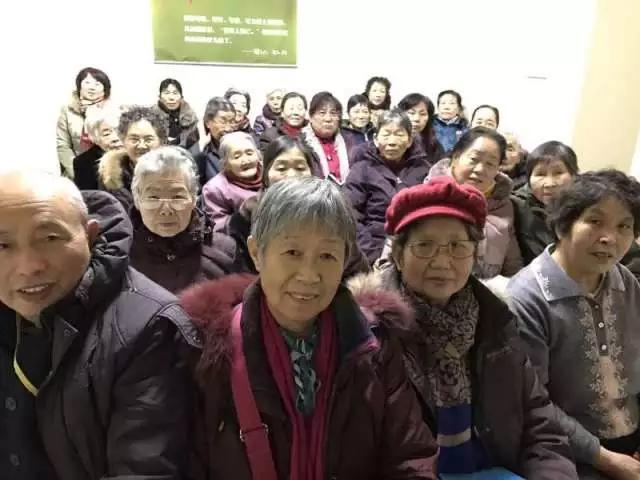In January 2021, after studying theology in Taiwan, Brother L returned to serve in Baiyuwan Church in his hometown Ningbo, Zhejiang Province. He shared about the ministry he carried out in the rural church and how he viewed the aging of the rural church with the Gospel Times, an online Chinese Christian newspaper.
Gospel Times: Which kind of vision did you bring back to the rural church?
Brother L: I have two visions. The first vision comes from the scriptures of Ephesians 4:11-12. That is to say, the revival of the church is not only a matter of the pastors or church volunteers but every believer who has received salvation. Therefore, we conduct training programs for group leaders, in order to let more people participate in church service.
The second vision is that the existence of the church is not only for believers but also for all the people in this area.
What impresses me much in Taiwan is that churches outside mainland China are all oriented toward evangelism, but domestic churches focus on pastoral care rather than the gospel. The churches in mainland China seem to just love and take care of church members only, with evangelism often being just a slogan on the altar.
With such a vision, our church once invited doctors to provide free medical treatments to unbelievers. Also, we let experts teach the farmers how to plant a kind of orange named “red beauty”, then hosting an evangelical meeting. It is a bit like relational preaching, they came to learn how to keep healthy and plant oranges, otherwise, they never came when invited. This is the complete gospel sermon, just as Jesus preached the gospel of the kingdom after healing the sick and casting out demons.
Gospel Times: Does your village party secretary also support these activities?
Brother L: He was very happy as these were good things for him. If we spent money to organize these activities well, he would have a good reputation.
Our church services are attended by people from three nearby villages, to whom these activities are spread.
In addition, there is a 3A scenic spot on the bay near our church. With this advantage, we decided to provide some services for tourists, including free coffee or tea, but we still need dedicated people to entertain them. Previously, our church opened to tourists for a period of time, but some of them were not even flushing the toilet after using it. After a long struggle, we decided to close the church from tourists.
I am thinking that if the church opens to tourists again, we could charge a nominal fee to hire someone to entertain them. After visiting the church, unbelievers might have access to the gospel and get a good impression of it.
Gospel Times: How do you think about the aging of rural churches?
Brother L: The aging of rural churches is very serious. Like our church, only one-tenth of believers are young people, but I think this is reasonable. Feeling the pressure of high mortgage, most young people have gone to work in big cities such as Beijing, Shanghai, Guangzhou, Hangzhou, and Ningbo.
In our village, only the people coming from other places fish, as well as young villagers are unwilling to farm here.
Gospel Times: What is the future of rural churches with the problem of aging?
Brother L: Facing the problem of aging, we should use the national concept. Rural churches are losing young Christians, but the city churches may have more young members. So it depends on the perspective being considered.
Our church staff shares the gospel with tourists in nearby scenic spots, so visitors come here continuously and receive the gospel. Although the same tourists may not attend the church services here twice, he will go to his local church. So, from the perspective of the kingdom of God, we still saved a soul.
In addition, we should focus on the spiritual growth of believers through pastoral care, rather than spend too much energy on the church, regardless of the problems of aging or the troubles in which the government may ban the church when believers do not gather there.
Gospel Times: Does your church have connections with the urban churches?
Brother L: Our church has already got connections with some churches in Hangzhou before I came back. Our 52 churches are connected with each other and have a fellowship specially for young people. For example, if we have college students who are catechumens, we hand them over to the urban churches to be nurtured.
Gospel Times: In a rural church, do you have difficulties communicating with the elderly believers when you face them every day?
Brother L: First of all, I think we should regard them as grandparents, or even as God. Because the Lord said, “Whatever you did for one of the least of these brothers of mine, you did it for me”. For another example, in group sharing, we should lead elderly believers to the truth, as some of them may keep on talking, and some don’t say anything.
After a group prayer meeting, a senior Christian called me over to communicate until 10 pm, which I think is a sign of trust. It’s opposite to the cities where there is a lot of mistrust between people, so I'm happy to be in the countryside.
As pastors, we should be truly willing to listen to church members, not just saying "I love you with the love of Jesus".
Later I let the aged believers first communicate with group leaders who can later come to me if they can’t solve some problems.
- Translated by Abigail Wu












